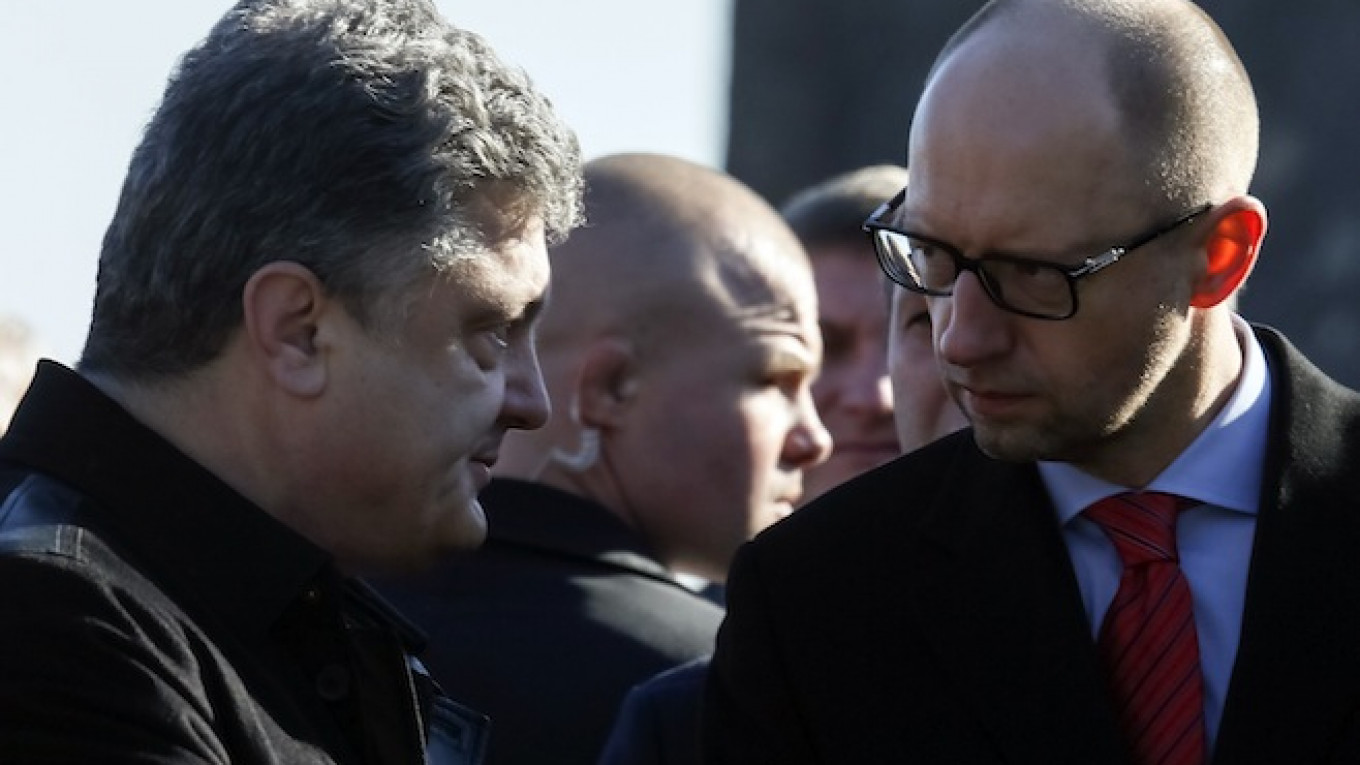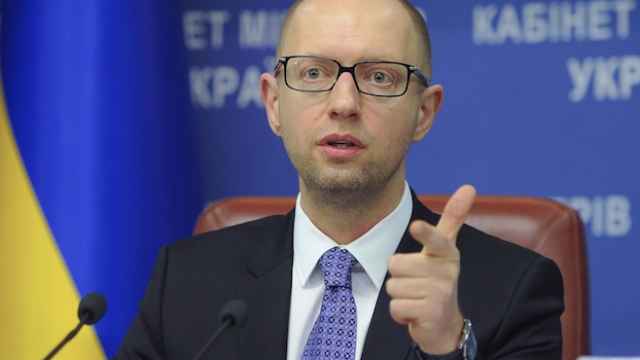KIEV — Ukrainian President Petro Poroshenko threw his support behind Arseniy Yatsenyuk for a new term as prime minister on Friday, ending speculation that he would seek to try to bring in his own candidate as head of a new pro-Europe, reformist government.
Ukraine won vital breathing space by sealing an interim gas supply deal with Russia on Thursday that will see it through winter, but the new Kiev government faces a mountain of other problems, not least pro-Russian insurrection in eastern areas.
Poroshenko offered his quick backing for Yatsenyuk after the 40-year-old former economy and foreign minister, whose People's Front ended slightly ahead of the president's own bloc in an election last Sunday, had bluntly said he expected to stay on.
Commentators said the move could ultimately hasten arrival of an International Monetary Fund mission to trigger disbursement of fresh credit under a $17 billion dollar stand-by program.
The move confirmed that the partnership between the two men will dominate Ukraine's political landscape in the near future as it battles a separatist rebellion in the east and pursues a course for European integration deeply opposed by Russia.
Power-sharing talks have been going on behind the scenes since the poll gave a resounding win to pro-Europe parties, shifting the ex-Soviet republic further away from the Russian orbit despite the eastern rebellion.
Yatsenyuk in effect laid down an ultimatum to Poroshenko that he could forfeit the support of the People's Front in any parliamentary coalition if he did not agree to him staying on as head of the government.
"I have proposed to the faction of the Poroshenko bloc that it submits Arseniy Yatsenyuk as a candidate for prime minister," Poroshenko said in a tweet.
The war in the industrialized east has ravaged the economy. State statistics on Thursday showed a 5 percent contraction in the third quarter year-on-year and the government sees only possible modest growth next year.
A vote for self-rule by separatist rebels in the east, which is due to take place on Sunday, threatens to create a "frozen conflict" in Ukraine's eastern industrialized Donbass region.
Though these elections have been denounced by Western governments, Russia has suggested it may recognize their validity, dooming prospects for an improvement in relations with Kiev despite the breakthrough gas deal reached in Brussels.
IMF Mission
Commentators said though that Poroshenko's backing now for Yatsenyuk would accelerate the formation of a coalition of support and ultimately of a new government. This in turn could hasten disbursement of fresh credit under an IMF stand-by program.
"Coalition building will be quicker, the coalition government will have a strong reform majority, and a government can be formed more quickly, to ensure speedy sign off on the next tranche of IMF money," wrote Timothy Ash of Standard Bank.
Yatsenyuk was named prime minister in the turmoil that followed the "Euromaidan" street protests which forced Moscow-backed president Viktor Yanukovych to flee along with his aides and family last February.
Known for a hawkish stance towards Russia, he has won favor in the West through his commitment to deep, sometimes unpopular, reform and his calm direction of the war-ravaged economy.
On Friday, he told Ukraine's European partners that Kiev would guarantee the smooth transit of Russian gas and would not allow Russia "to blackmail" it.
There had been speculation that Poroshenko, a 49-year-old confectionery magnate, would prefer to have a close party ally, Volodymyr Groysman, as head of a new government.
Groysman's role in working out a blueprint for de-centralizing local powers in the separatist-minded east feeds into the task of bringing peace to the region, one of the main tasks before the new leadership.
"Poroshenko has fulfilled his promises to Yatsenyuk. He realistically assessed the situation and understands that without the People's Front it is impossible to create a coalition," said Volodymyr Fesenko of the Penta political research centre.
"He has held out his hand to Yatsenyuk, and the tension between their political forces has diminished," Fesenko said.
People's Front has finished with just more than 22 percent of the votes counted on party lists, fractionally ahead of the Poroshenko bloc on 21.80 percent.
Poroshenko is also in power-sharing talks with the Batkivshchyna (Fatherland) party of former prime minister Yulia Tymoshenko, a radical populist party and Samopomich (Selfhelp), a party headed by the mayor of the western city of Lviv.
A Message from The Moscow Times:
Dear readers,
We are facing unprecedented challenges. Russia's Prosecutor General's Office has designated The Moscow Times as an "undesirable" organization, criminalizing our work and putting our staff at risk of prosecution. This follows our earlier unjust labeling as a "foreign agent."
These actions are direct attempts to silence independent journalism in Russia. The authorities claim our work "discredits the decisions of the Russian leadership." We see things differently: we strive to provide accurate, unbiased reporting on Russia.
We, the journalists of The Moscow Times, refuse to be silenced. But to continue our work, we need your help.
Your support, no matter how small, makes a world of difference. If you can, please support us monthly starting from just $2. It's quick to set up, and every contribution makes a significant impact.
By supporting The Moscow Times, you're defending open, independent journalism in the face of repression. Thank you for standing with us.
Remind me later.






